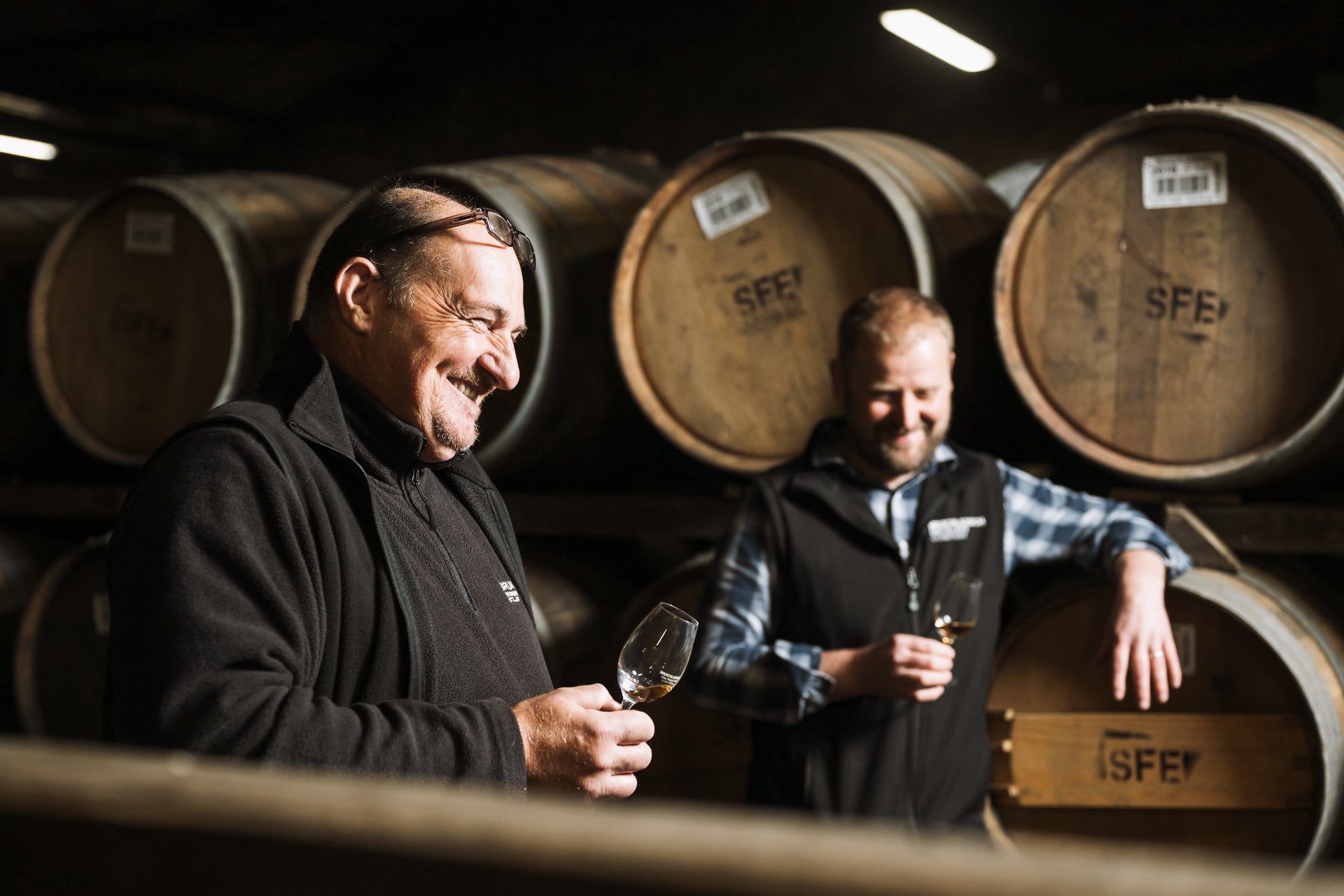The Why of Whisky
- 7 mins
The global appeal of single malt Scotch comes from something more than what we taste and smell. In this article, The Mash Editor Rachel Glueck explores the why behind whisky’s gravitational pull.

It looks like you are visiting our website from outside the UK.
You can switch to our global site to browse our single malts, buy current releases online for delivery to select countries and locations globally, explore the latest news and create an account.The global appeal of single malt Scotch comes from something more than what we taste and smell. In this article, The Mash Editor Rachel Glueck explores the why behind whisky’s gravitational pull.

En route back to Islay after a trip to Sligo, I met a friend at Glasgow’s iconic whisky bar: The Pot Still. He chuckled – I noted a trace of cynicism – when he found me already engaged in conversation with strangers, but it wasn’t long before he too was fully immersed in the banter; thoroughly enjoying the craic. As Irish poet W.B. Yeats said: "there are no strangers here, only friends you haven't yet met". Those who know the Irish or have spent any time at all in a pub in the Emerald Isle, will identify with this. It’s as though this spirit of camaraderie and goodwill so common throughout the Gaelic lands has been captured and transformed into palpable form. The resulting substance is, of course, whisky.
Dave Yancey writes that whisky is “... a symbol of both joy and despair, a catalyst for camaraderie and introspection, and a metaphor for the human experience itself.” It carries a weight that draws people across countries and cultures into a community that encourages a passion for learning, sharing, and lifting up fellow devotees. But what is it about this spirit that captivates and makes so many of us such fervent enthusiasts?
We might boil it all down to flavour. Undoubtedly a vital aspect, the exploration of flavour is what draws most of us in at the start. But if we’re honest, whisky isn’t the only thing that has a dazzling array of taste variation. (Walk down a supermarket aisle, and you’ll know what I mean). What is it, then, that we find so enthralling?
Is it the craftsmanship? Of course. The sense of ceremony and sacrament that so oft accompanies a dram? Yes. But there’s something more to it than what we can decipher using mere logic.

Shift Operator, Dominik.
"The more we use our conscious minds, the less we perceive."
Dave Broom, acclaimed whisky writer and author of A Sense of Place, has been known to host events that show how we perceive a whisky isn’t only due to smell and taste. Fellow writer, Felipe Schrieberg tells of how Broom, at one such tasting, handed out headphones and notecards labelled ‘salty’, ‘sweet’, ‘bitter’, ‘metallic’, and ‘mineral’. He then served up a dram and played different tracks of music as everyone tasted. The flavours that the attendees picked out changed as the music changed. Schrieberg writes, “To Broom, music not only serves as a universal trigger for people to discover and highlight flavour, but it also increases their ability to relate to fellow tasters or drinkers through the whisky. Especially as they become familiar with whisky, audiences are far more engaged via the music angle than through a more ‘orthodox’ tasting...”.
Back in August I had a conversation with Broom. He talked about his move away from tasting notes – his interest these days is more in what people feel when drinking a particular whisky.
“Obviously, flavour is important – it's vitally important. But the reason you buy a second bottle or a second dram of that whisky is because it’s made you feel something...That’s where whisky is like art. You know, it’s that transcendent moment where you were taken from sitting in that room...and you’re somewhere else with just that one sip. Just as hearing a tune transports you to somewhere else. Or reading a piece of prose.”
If sound influences how we perceive a whisky, what about sight, atmosphere, touch, and the company we’re in? How does our perception of a whisky change when we’re sharing it with a new friend at their home on Islay versus drinking it at a Glaswegian whisky bar, or a nightclub in Singapore? How do our emotions change our perception of a whisky, and how does a particular whisky change what we’re feeling?
Diving into the land of single malt whisky is akin to entering another world entirely – imagine Charlie entering Wonka’s chocolate factory for the first time. All of this is to say that if our experiences of whisky are so wildly diverse and so incredibly multisensory, why limit the conversation to taste?

Although single malts are now considered a luxury, whisky was the drink of choice for any and all occasions amongst the proletariat – and in our part of the world, still is. In Western Scotland, for example, there’s the tradition of handing out whisky at the end of a burial. The bottle, it’s important to note, must leave the cemetery empty. Weddings were, and often still are, marked by the bride and groom sharing whisky out of a quaich – the two-handled “loving cup” (Google it if you don’t believe me). And then there’s my favourite traditional application of whisky: as a lubricant to settle arguments. In Glencoe, when members of Clan MacDonald struggled to resolve their quarrels, they were sent to the tiny Eilean na Comhairle (the Isle of Discussion) off the southern shores of Loch Leven and left there until they resolved their dispute. The supplies they were given were nothing more than oatcakes, cheese, and of course...whisky.
As Bruichladdich Warehouse Operator Jay Doherty says, “If I could wave a magic wand and cure all ills, I’d recommend everybody have a whisky. Start off with a dram and see where we’re all going wrong, and then come to a consensus."
Given its long history of importance in the lives of the Scottish and Irish, it makes sense that whisky carries such rich symbolism – at least for those raised under or near the influence of Gaelic culture.
“It’s the old Celtic thing...around the hearth,” says Jay. “It takes you back – it’s like a primordial soup.”
But how is it, then, that those in Germany, Japan, or India become so captivated by the spirit?
I pose the question to Jay, who has just returned from hosting a Bruichladdich tasting at the annual Celtic Castle whisky event in Germany. Our conversation wanders through taste, smell, memory, whisky friendships, and philosophical musings. It’s agreed that themes of friendship, camaraderie, and family run unspoken but ever-present, through whisky circles.
“There’s a hospitality to it, goin' back to that hearth thing,” he says.
Jay tells me about the countless situations where he’s been stranded whilst travelling and calls upon a friend to help him out.
“I could do that on five continents, I’d say.”
He pauses.
“Mostly because of whisky.”
“You meet so many good people through it, and you would strive to be of the same moral fibre as those people. The majority of whisky people I’ve met are really nice people.”

Warehouse Operator, Jay, and Head Distiller, Adam.
The question of what makes whisky so captivating is such a broad, intangible one it’s nearly impossible to put your finger on the answer. But you need only pose this query to the congregation to hear the response in great and glorious chorus: Whisky is about People.
It’s the people who put their passion and skill into making the casks, growing the barley, distilling the spirit; the people who put their sweat and muscle into bottling the millions of litres that are enjoyed across the world.
And it’s the people we share that whisky with. Those we welcome into our family with a dram; the friends we see at Rock’ndaal year after year; the strangers who offer us a welcoming smile on our visit to Islay. Whisky is undoubtedly an opportunity for armchair adventure, but it’s not the adventure itself so much as who we share it with and the feelings it inspires that make us Whisky’s devotees.
Some may argue that all of this is also true for wine. There’s certainly a similar level of craft, knowledge, and complexity that goes into its production, and on a global scale, it’s unquestionably the most popular barrel-aged beverage for social occasions. But while wine brings us together with friends and family, it’s whisky that makes us friends with strangers.
Why whisky, above all other spirits, has this effect may be something we can never pinpoint, but it’s a subject worth pondering lest we find ourselves chained to the dogmatic territory of the flavour wheel and far from the cherished essence of uisge beatha.
I took this question of why whisky? where I take most of life’s conundrums: to the hills. I climbed the farm track leading towards the loch that supplies the distillery’s water and looked out across the warehouses below. It was one of those perfect, sun-drenched Islay afternoons with cloud shadows scattered across the fields of freshly harvested barley and the little puffs of white sheep mewing in the distance. I paused and took a deep breath. And then it struck me.
Presence.
Whisky requires us to be present with it. It jolts us into the moment – grabs us by the lapels and demands we pay attention. Whisky isn't a pyjama drink, allowing us to sink slowly into the comfort of our familiar surrounds. Oh no – to embark on a whisky expedition, we need to pull on our foulies, grab our map and compass and take a deep breath before entering the unknown. We drink whisky to discover – a journey that necessitates presence.
Whisky asks us to be curious. The curiosity of the distillers and blenders unfolds a multiverse for the drinker, allowing for an endless catalogue of Choose Your Own Adventure Stories. We couldn’t ask for a greater guide than curiosity.
But, what fun is exploration if you don’t share your discoveries with others? In a sometimes-solitary world, whisky brings us together and reminds us of what matters most in life. Because at its heart, whisky isn’t a commodity. It’s a conversation.
Presence, curiosity, and connection. These, we might note, are the elements of a life well-lived.
So, when you pour your next dram, enjoy the multitudinous of flavours, but don't forget to bring yourself fully into the moment or to ask yourself: Where does this whisky take me, and who would I want to share the adventure with?

The Mash editor, Rachel – and her Australian cattle dog, Chiki.
DISCOVER THE LATEST STORIES AND NEWS FROM BRUICHLADDICH DISTILLERY

Please enter your birth year
Location
You must be of legal drinking age in your location of residence to enter bruichladdich.com. By entering our website you agree to our Terms & Conditions and Privacy Policy. We encourage you to enjoy our single malts responsibly.
You must be of legal drinking age in your location of residence to enter bruichladdich.com. By entering our website you agree to our Terms & Conditions and Privacy Policy. We encourage you to enjoy our single malts responsibly.
You must be of legal drinking age in your location of residence to enter bruichladdich.com. By entering our website you agree to our Terms & Conditions and Privacy Policy. We encourage you to enjoy our single malts responsibly.
You must be of legal drinking age in your location of residence to enter bruichladdich.com. By entering our website you agree to our Terms & Conditions and Privacy Policy. We encourage you to enjoy our single malts responsibly.
You must be of legal drinking age in your location of residence to enter bruichladdich.com. By entering our website you agree to our Terms & Conditions and Privacy Policy. We encourage you to enjoy our single malts responsibly.